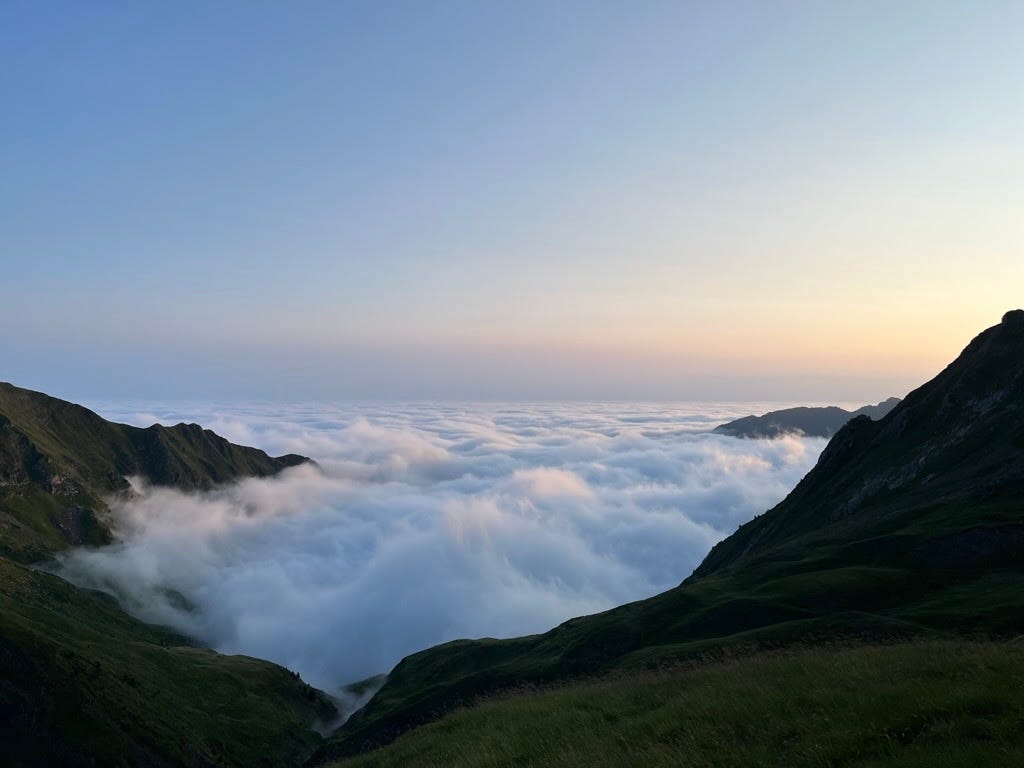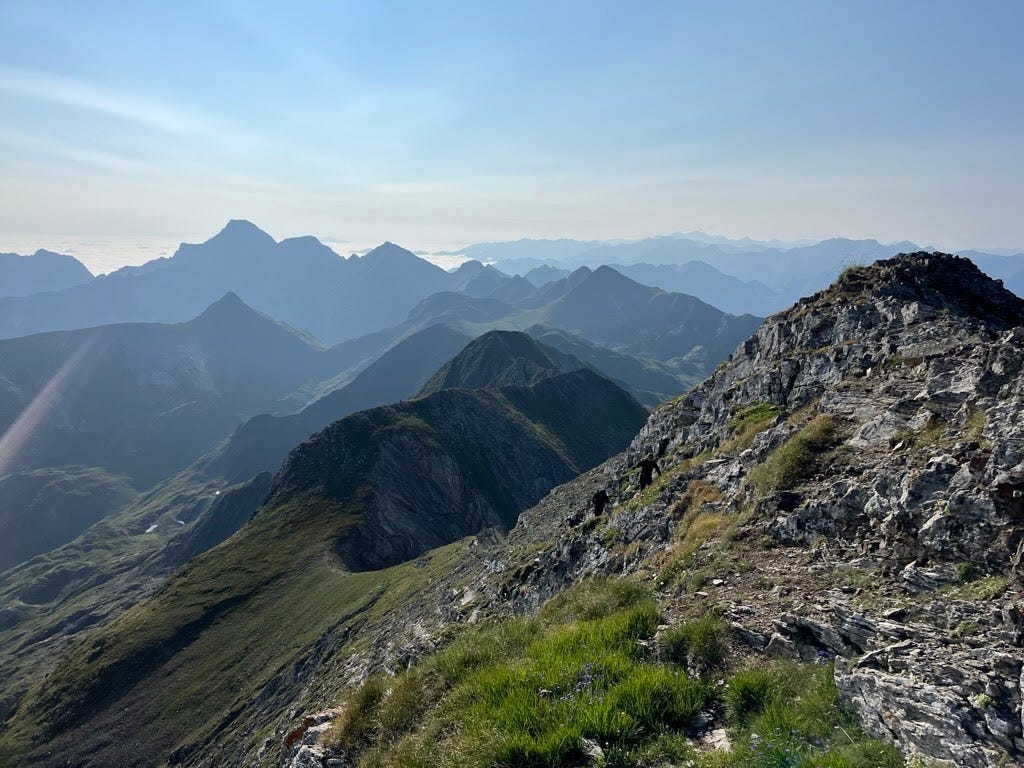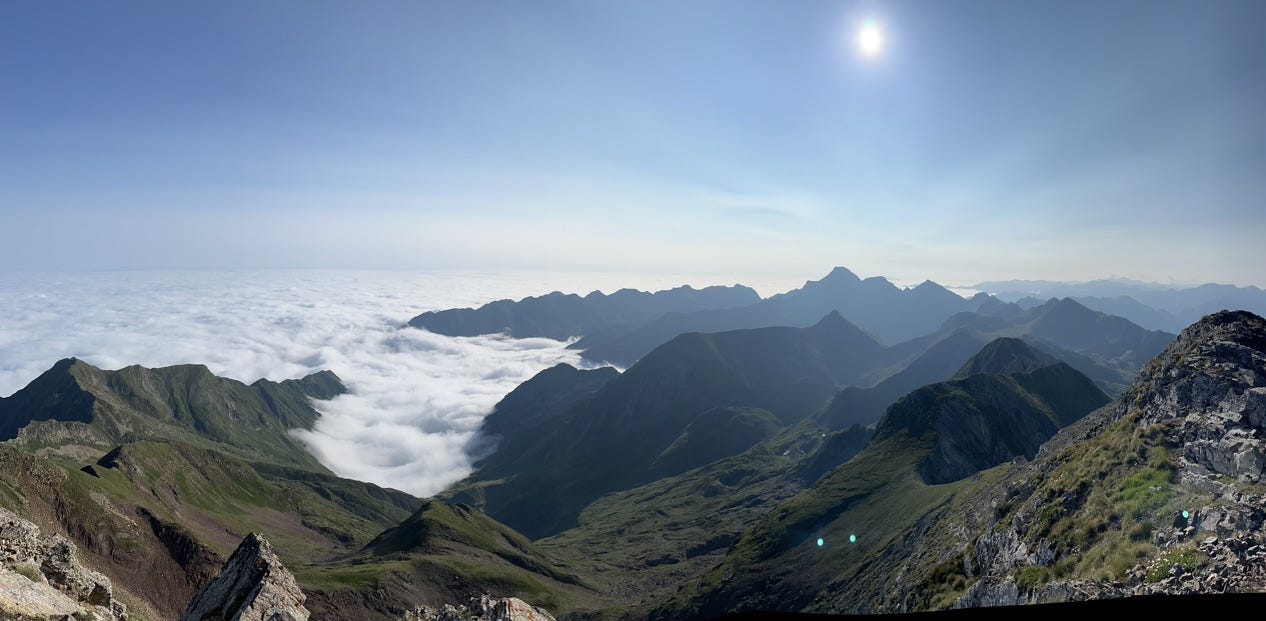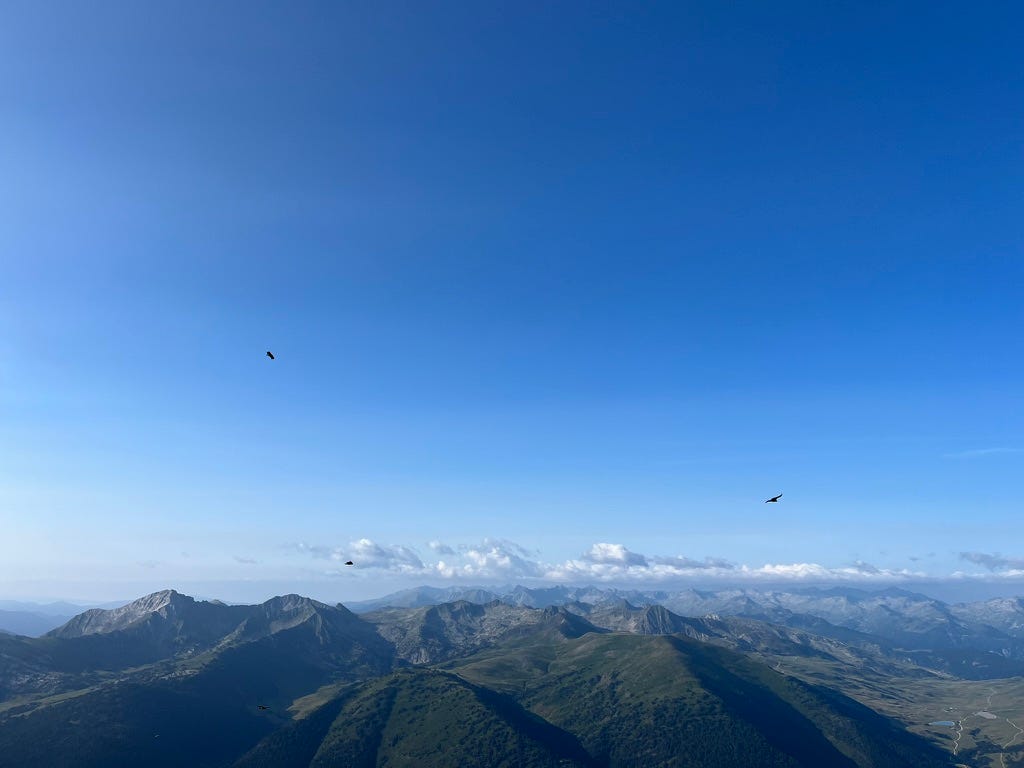
Governing with the more-than-human world
What does this mean, why should we care, and how could we do this in practice?
https://demnext.substack.com/p/governing-with-the-more-than-human
It’s 5.30 a.m. and I can hear rustling outside our tent. Our guide is gently getting up our small group. It’s cosy in the sleeping bag, but the excitement of another day’s adventures means I’m alert and getting dressed quickly. I unzip the side of my tent. The grass is covered with pearls of water. I can smell it. A mist hangs low amidst the soft morning light. Stepping outside, I now see that we’re just above a sea of clouds, where yesterday we could see into the valley below.
Turning around, I examine the peak we will start with this morning while the air is fresh. An 800m climb up to just above 3,000m of altitude. It’s not a path that’s marked on the maps. Our guide is from the region and knows the hills like the back of his hand. There is a certain thrill to discovering the wilder places outside the well-marked paths. After having some breakfast, coffee, and packing up our camp, I go down to the river to wash my face and fill up my water bottle. Ready, we set out on our climb. There is not another human in sight in all directions. Only our group of six and the birds chirping. Over an hour later, we reach a ridge that opens up a view to the other side. We are technically in France, and a few steps away is Spain. The wind is fiercer without the protection of the mountain side, but it makes me feel alive. Only 200m left to the top. The promise of 360 views is one of the motivations of many mountain lovers. There is another kind of wonder that emerges when a real effort has been demanded to get that view as well. I can now see the vastness of the sea of clouds. The wind is even harsher here. “Look!” Our guide points us to a first vulture that flies past. There’s a second, and a third, and fourth. There were around fifty vultures that flew together that morning. An amazing sight that stopped us all in our tracks, mesmerised. It has remained the only time in my life that I’ve witnessed a wake of vultures like that. There was no way my phone camera could capture this moment; they were all around us in all directions. I put it away and watched them, the memory strengthened in my mind. I’ve been working on questions of governance and democracy for well over a decade. It’s only been in the past four years that I would say my own relationship with the natural world has shifted—when, in a moment of personal crisis, I sought solace in the hills and forests. It was around this time that I met my now dear friend and DemNext Board Chair Robbie Stamp, who offered me The Spell of the Sensuous by David Abram, setting me down an intellectual journey. This paper and wider project is part of that path. For a long time I saw my personal interests and experiences in the mountains as separate from my intellectual work on democracy. It’s only recently I’ve started to see the threads and connections between the two. I had an ‘aha’ moment when someone asked me “Why do you talk about your love of nature so much?” in a professional setting last year, where I realised that I was even doing that. It prompted me to write a first essay on “more-than-human democracy” that flowed out of me. As I started writing, the connections suddenly seemed obvious. Our relationship with the living world comes forth in questions about belonging, connection, borders, citizenship, time, place, and community. These are all the foundations behind ‘democracy’, upon which our institutions, practices, and rituals get formed. Without a solid foundation, we cannot have a solid democracy. At a time when there is widespread consensus about ‘democracy in crisis’ all over the globe, going back to the fundamentals about agency, trust, connection, belonging, curiosity, and other relational elements is essential. Expanding that beyond the human-centric lens to recognise we are in relationship not just with each other but with the living world - that we are not separate to it, but a part of it - is equally essential. Going back to the mountaintop for a moment, when you are straddling what are two different countries, surrounded by nothing but wind, seas of clouds, vulture wakes, and mountain peaks in all directions, you suddenly feel like a very tiny part of this immense planet. It makes me think about borders in new ways. It’s in those moments I feel most grounded and part of something bigger than myself. What does this mean then for innovations in governance? What would it entail to govern with, not just for, the living world? The answers to these questions are not obvious to me. People sometimes bring up caricatures like placing a plant at the deliberation table. That is clearly far from the answer! But what is a thoughtful approach to more-than-human governance? What could it mean, in practice, to experiment with such approaches? These are the questions that are at the heart of this initial discussion paper, and are at the heart of DemocracyNext’s project on more-than-human governance. In conducting research on these issues, I’ve interviewed practitioners, lawyers, theorists, designers, artists, and others who are experimenting with different approaches. From interspecies councils to legal approaches that give new rights to elements of the natural world and animals, to artistic practices that create embodied experiences of new governing relationships, and other examples, there has been a richness in imagination about how to approach these questions… DemocracyNext and Arising Quo will publish a follow-up paper this summer going into greater depth, as well as the learnings emerging from our convening next month in the Netherlands. This paper is intended to serve as as starting point for an ongoing conversation. Please feel free to get in touch with any ideas, comments, or additional examples: claudia@demnext.org Claudia Chwalisz is the Founder and CEO of DemocracyNext. She has been working on democratic innovation for over a decade, initially sparked by her research on populism and the extent to which it is driven by people’s disillusionment with the political system and with a lack of agency to shape the decisions affecting their lives. Claudia was involved in designing the world’s first permanent Citizens’ Assemblies in Paris, Ostbelgien, and Brussels. Claudia established and led the OECD’s work on innovative citizen participation from 2018-2022, creating the Deliberative Democracy Toolbox, which includes a public database of over 700 examples of Citizens’ Assemblies, the flagship report Catching the Deliberative Wave (2020), standards for implementation (2020), and guidelines for evaluation and institutionalisation of deliberative assemblies (2021), as well guidelines for citizen participation processes (2022). She led the drafting of the OECD Action Plan on Enhancing Representation, Participation, and Openness in Public Life (2022) and the related chapter in the Building Trust and Reinforcing Democracy report (2022). Claudia also set up the OECD Innovative Citizen Participation Network and the blog Participo. She managed five pilot projects of citizen participation in cohesion policy, supported by the European Commission, advised on institutionalising deliberative democracy in the Basque Country in a project with Arantzazulab, and advised on designing deliberative processes in Finland and Lebanon. Claudia is an Obama Leader 2023 and serves on the Advisory Boards of the UN Democracy Fund, MIT Center for Constructive Communication, The Data Tank, and Design & Democracy. She is the author of The Populist Signal: Why Politics and Democracy Need to Change (2015) and The People's Verdict: Adding Informed Citizen Voices to Public Decision-making (2017), and the co-editor of New Routes to Social Justice (2017) and The Predistribution Agenda (2015).
Read the rest of Claudia Chwalisz’s exploratory paper (PDF) on more-than-human governance on our website →













